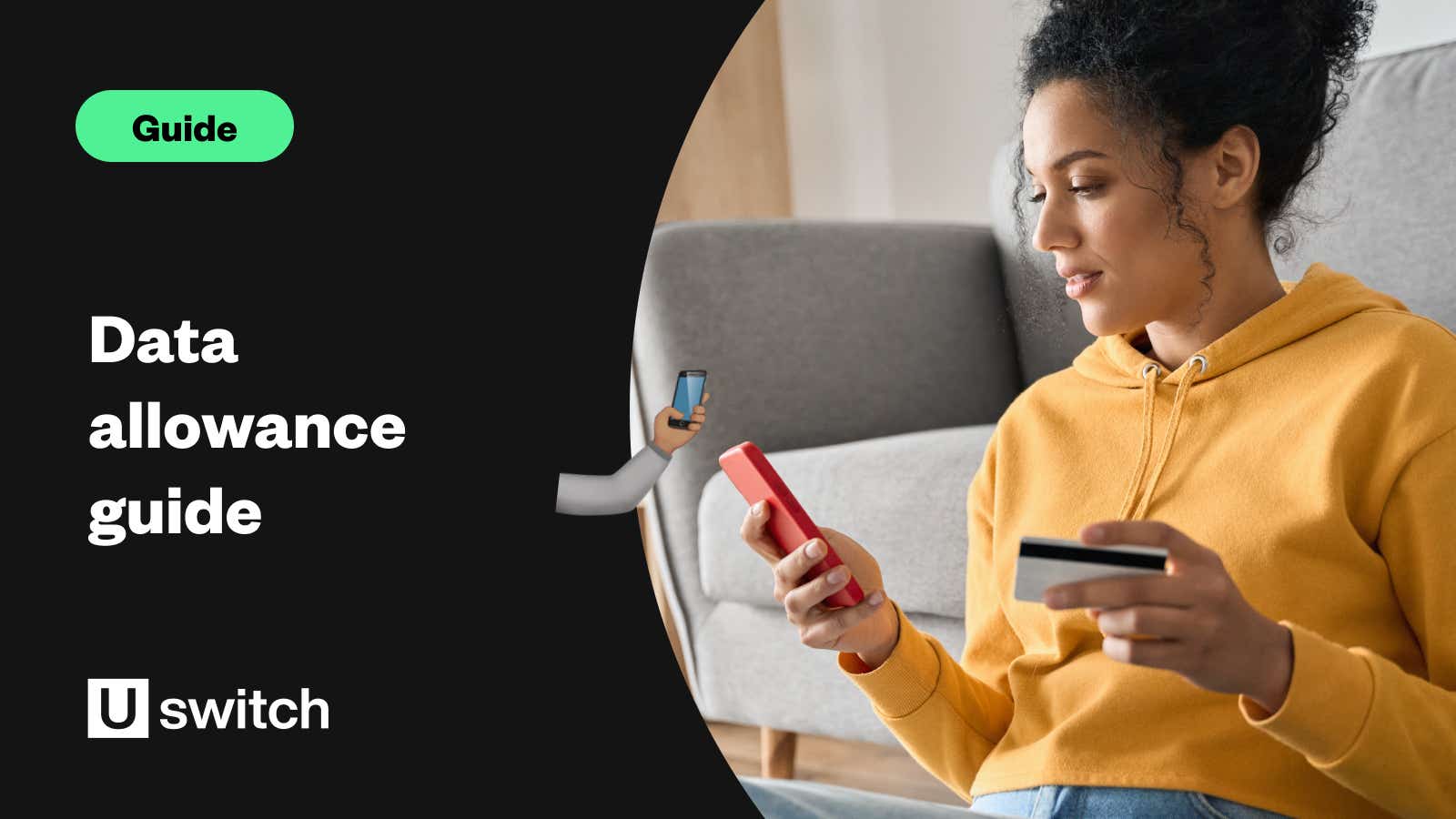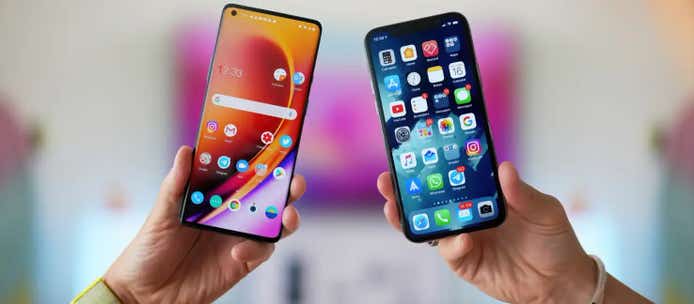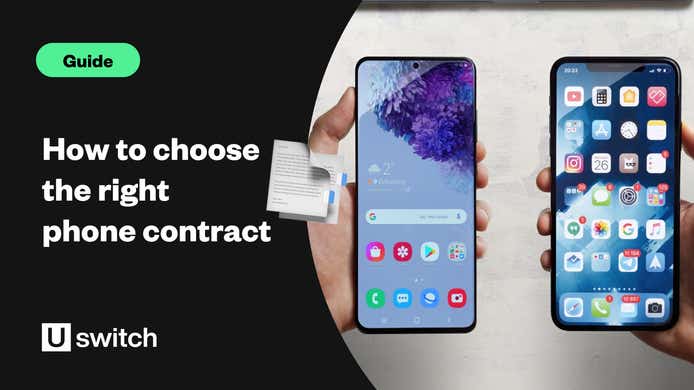Mobile data usage: the basics
Data allowance can be tricky to work out. While the cost of data continues to drop, our reliance on apps and being constantly online means that it can be hard to establish out just how much you need.
And that’s before you’ve taken into account which networks have the best deals when it comes to using data–guzzling tools, like Netflix and Spotify.
Whether you’re looking to curb how much data you use or you're keen to find a package that will allow you unrestricted access to the fastest data networks, our guide has got you covered. Keep reading and we’ll explain everything you need to know, from how data is measured to how you can avoid paying over the odds.
Want to know how much data you need? Check out our data calculator tool
Mobile data usage: the basics
When you're downloading a movie or streaming a playlist over 3G, 4G or 5G, you’re using up precious data. But you may not be certain as to how much data you’re actually using each time you open an email, use FaceTime, or scroll through Twitter. And that means you might be paying for data you don’t need, just to be on the safe side.
Research released by Citizens Advice in January 2019 found that a massive 71% of people on SIM only deals were overpaying for data they didn't use. It said that, on average, consumers were not using 2GB of their data allowance each month, totalling £800 million a year. What’s more, it reckons consumers could save £63 per year by switching contracts.
Worryingly, it also discovered that those who took out contracts with networks in–store were left with 4.2GB of unused data each month, with those who did so online winding up with 2.6GB of wasted data.
“Mobile companies should be doing more to help their customers save on data they don’t use, especially when it’s clear people are consistently underusing their allowance,” said Gillian Guy, CEO of Citizens Advice.
Compare mobile contracts and SIM only deals
Browse our best contract deals for the latest handsets or save money with a cheap SIM only offer.
What do MB and GB stand for? How is data measured?
Before we dive into working out how much data you need, we should probably get you up to speed with the terminology for measuring units of data, which in turn is used by networks to tell you how much data you get with a mobile phone contract.
- MB: This stands for megabyte and is made up of approximately 1000 kilobytes.
- GB: This stands for a Gigabyte. About 1000 megabytes makes up one GB.
The amount of data you get with your contract differs hugely. Some offer as little as 1GB per month and start from under £4 per month.
At the other end of the scale, there are costlier data plans that offer comparatively vast allowances of 200GB or even unlimited data.
How can I check how much data I'm using right now?
Checking exactly how much data you're using each month is easy. All you need to do is log into your account with your network, either on its website or via its app.
Once you're logged in, you'll be able to see how much data you've used so far this month and in previous months.
If you're often left with lots of unused data, you’re probably paying for a data allowance that's too big for your needs.
Accessing your account on your computer is just a case of visiting your network's website and logging in. Then simply navigate to the section of the app that covers your data allowance.
To check your data usage using your network's dedicated app, you'll first need to download it. Handily, here are links from major networks where you can get their customer-account apps:
Data usage explained: am I a heavy or light user?
A less precise but quicker way to get an idea of what sort of data allowance you need is to check which of these user profiles you match.
Low data user
"I use my phone every so often to keep up with friends and check the news"
You like to look at web pages or check your email.
You check your Facebook or Twitter online reasonably often.
You don't play a lot of games on your phone or download music directly on the phone.
You may occasionally use your mobile to chat online or watch the odd video clip.
You're unlikely to use your internet for more than an hour a day.
Sound like you? If so, you're a low-data user and you’ll find that a low data allowance of 2-5GB will cover you.
Medium Data User
"I need data for my email, social media and entertainment"
You download email daily to your phone via an on-board or downloadable email client such as Gmail.
You spend quite a bit of time browsing the internet and you download a few games or applications each month.
You like to watch videos on online streaming sites such as YouTube every so often and perhaps download a few songs now and then too.
Sound familiar? That means you're classified as a medium data user. You'll require a data allowance of 10GB per month at least.
Heavy data user
"I rely on my phone for both entertainment and work, as well as everything else"
You send and receive quite a few emails daily, often with attachments.
You watch videos online several times a week and are likely to download a lot of applications and games as well as music for your phone.
You also make extensive use of streaming services, such as Netflix and Spotify.
You rely on your mobile internet for work as well as communication with friends and family and need to use your phone for internet access for several hours daily.
Does that match your usage habits? That means you're classified as a heavy user. To ensure you never run out of data, you’ll probably need a monthly data allowance of around 20GB. Or you could opt for an unlimited data deal for total peace of mind.
Compare mobile contracts and SIM only deals
Browse our best contract deals for the latest handsets or save money with a cheap SIM only offer.
How much data do I need?
With more and more apps requiring access to data services, it can be hard to work out what apps use how much data.
You can check the exact usage on your phone. If you have an iPhone, fire up Settings, tap Mobile Data and scroll down to see which apps are using the most data. The one that’s eating up the most will appear at the top of the list.
Android users simply need to tap into the Data Usage menu in Settings to see a detailed graph of how their data usage has changed over the previous months, as well as a list of apps that are hoovering up the most data.
While these tools are great for giving you an overall picture of how much data you’re using, it’s good to know how specific services and usage break down too. The following is a good guide:
Streaming one hour of video on Netflix, iPlayer or Amazon Prime – 644MB
Streaming a two-hour movie in high definition – 4.2GB
Gaming online for an hour – 43MB
Streaming an hour of music via Spotify or Apple Music – 80MB
Browsing through 60 web pages – 140MB
Download one song – 4–8MB
Download a film trailer – 60–100MB
One hour of driving while using Google Maps – 5MB
With this information and an honest assessment of how you use your phone (for instance, how often do you stream music?), you should be able to make a pretty good guess at how much data you'll get through.
So, if you love watching movies via Netflix over 4G or 5G, you’re going to need bigger data allowance. If you only access the web or open email on your phone, then a smaller allowance should suit your needs.
How can I save data?
Running low on data is a familiar problem for many of us. And when the alternative is forking out for a costly add-on on top of your monthly phone bill, lots of users opt to struggle with the allowance they’ve got rather than buy more.
But it doesn’t have to be that way. Below we’ve compiled a list of tips to help you get more out of your monthly data allowance without costing you more money.
Download services over Wi-Fi so you can use apps offline
Wi–Fi is your friend when it comes to saving data. Regular home broadband or public Wi–Fi hotspots mean you can download whatever you need before you head out and shift to 3G or 4G networks.
Netflix, Amazon Prime and BBC iPlayer all allow you to download programmes over Wi–Fi, meaning that as long as you have enough storage space on your smartphone, you can stash whatever shows you want to watch without having to use data. This is particularly handy for train journeys, where 4G network access can patchy.
Likewise, Spotify and Apple Music allow you to download offline music, so you can listen to playlists, albums and podcasts without having to stream them. This will save data and also keep your battery kicking for longer, as it doesn’t have to work as hard by pulling information across the network.
Remember, too, that Google Maps allows you to download entire towns, cities and regions, meaning you can use your phone in Airplane mode and still get from A to B. This is particularly handy when travelling abroad and you’re concerned about using data.
What are data–free services? And how do different networks’ offers vary?
The growth of data rollover has come at the same time as more networks offering data–free services. This means that users can access certain services without them eating into their data allowance, meaning they can either cut back on their package or use it for other services.
Three’s Go Binge lets you stream Netflix, TVPlayer, SoundCloud and Deezer without eating into your monthly data allowance. So you can watch your favourite shows and listen to music without using any data or having to download anything.
Virgin Media customers on select plans can use WhatsApp, Facebook Messenger and Twitter without eating into their monthly data allowance.
VOXI lets you use social media sites like Facebook, Facebook Messenger, Instagram, WhatsApp, Pinterest, Snapchat, Twitter and Viber without eating into your data allowance.
Data rollover plans
Networks are increasingly aware of users having data left at the end of their monthly billing cycle and allowing them to roll it over into the following four-week period.
Sky Mobile is the best example of this, as it allows you to roll over any unused data at the end of each month and store it in an online ‘piggybank’. That data will be there whenever you want to use it for up to three years at no extra cost.
iD Mobile lets you roll on one month’s worth of unused data, which stops you from building up a huge trove of unused data. But because any rolled-over data from the previous month is used first, any data that’s left at the end of the month can then be rolled over again.
Virgin Media also lets customers rollover one month’s worth of data at a time. But, just like iD Mobile, you use any rolled-over data before your regular monthly allowance.
Vodafone customers on a pay-as-you-go Big Value plan can roll over any unused data at the end of the month. But you can only roll over one month’s leftovers at a time, so you can’t stockpile endless data.
O2 customers can roll over any unused data to use the following month. But this only applies to additional data purchased on one of O2’s bolt-ons.
For more information, take a look at our guide to data rollover.
Flexible contracts
If your data usage varies a lot from month to month, a flexible contract might be the perfect solution. Rather than tying yourself into a set monthly allowance for the next two years, you can now choose a tariff that lets you change it up every month.
So if you know you’re going to be using your phone a lot over the next month, you can choose to up your data allowance. Or if you’re paying for more data than you’re using, you can downgrade your monthly contract to a cheaper one with a smaller allowance.
O2, for example, offers a range of flexible contracts to help you manage your monthly allowances.
Sky Mobile also lets you increase or decrease your data allowance whenever you want, so you’ll always have the amount that suits your needs.
For more data-saving tips, check out our guide on how to limit your data usage.
How can I use my phone abroad without running up a huge bill?
With horror stories of holiday-makers receiving huge bills for using their phones abroad, it’s easy to see why people are wary of switching on their devices when they’re out of the country.
But there are lots of ways you can use your mobile wherever you are in the world without it costing you a fortune.
Following Brexit, many networks have reintroduced roaming charges within the EU. This means that you may now need to pay an additional fee when travelling in Europe.
Still, customers on O2, iD Mobile, Sky Mobile or Virgin Mobile still get inclusive roaming in EU destinations.
If you’re travelling further afield, most networks allow you to buy a travel add-on, so you can use your phone without worrying about running up a huge bill.
If you want to find out more before you fly, check out our complete guide to data roaming.
How much does it cost if you go over your data limit?
Most networks will now warn you when you’re about to go over your data limit, allowing you to purchase add–ons rather than paying per MB. If this keeps happening, be sure you upgrade your deal, as it’s cheaper than constantly paying out.
SIM-only contracts make it easier to do this. Also, networks like Smarty and VOXI allow you to easily tweak your data allowance every month depending on your needs and usage.
How much it's likely to cost you to go over your allotted mobile phone internet limit varies, depending on which tariff you have chosen and which network you are with.
However, in some cases it gets very expensive when you exceed your mobile data limit. So it’s important to find a tariff that matches your needs.
What is a fair use policy?
Some mobile networks simply limit your internet usage rather than charge extra when you exceed the data you've paid for. This is called a 'fair use' policy.
It means that you may not incur an extra charge when you use up your monthly allowance, but you may be penalised if you go over by what the network decides is 'fair'- often around 500MB.
But that's not all. Some networks that favour fair usage policies will reduce your internet speed until your monthly allowance renews, so you will not be able to stream long videos or download large applications.
It’s worth contacting your network and asking them to explain this policy fully. That way you can either change deals or at least get to grips with how much data you’re using each month and work out how to moderate it.
What about 5G data services?
5G is the next big thing in mobile, delivering speeds that exceed home broadband.
5G is considerably faster than 4G, and while this means that you'll be able to download entire HD movies in seconds, be aware that this will use up a lot of data.
Luckily, some networks have changed their plans a bit to accommodate 5G. For instance, Vodafone's Unlimited plans work more like a broadband plan - you get unlimited data as standard but the price plans are varied by speed.
Compare prices for the best-selling smartphones here: Compare contract phones
Compare mobile contracts and SIM only deals
Browse our best contract deals for the latest handsets or save money with a cheap SIM only offer.





